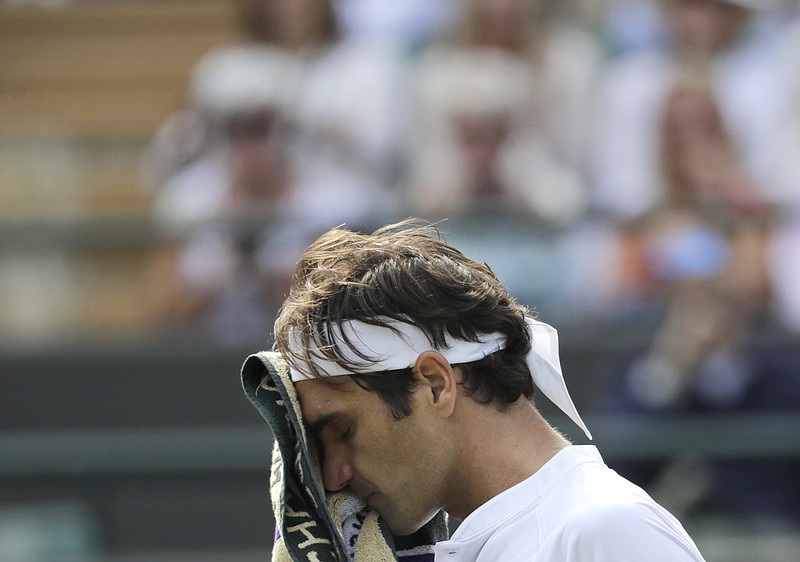This was supposed to be the night everyone who cares about professional men's tennis couldn't wait to arrive. It was to pit Novak Djokovic, the best player of the past five years, against Roger Federer, arguably the best player of all time, in a U.S. Open quarterfinal under the lights at Arthur Ashe Stadium.
It was supposed to be the first really big match of the Open - must-see TV, one of those matches sure to momentarily displace football in chat rooms and on talk radio for at least an hour or so on Thursday in advance of the start of real NFL action.
Alas, some journeyman pro from Australia, some remarkably skilled 29-year-old answering to John Millman, ran a flustered, fatigued, fragile Federer out of the Open in the round of 16 as Monday night gave way to Tuesday morning, the world No. 2 supposedly done in as much by stifling heat and humidity as the machine-like Millman.
"I couldn't get air," an exhausted Federer said afterward. "I just struggled in the conditions. It's one of the first times it's happened to me."
At this U.S. Open, beset by unseasonably high temperatures and humidity from the start, Federer was not the first to succumb to such double trouble. Nor was he the last. The big-serving American and former Georgia Bulldog John Isner melted against Juan Martin del Potro on Tuesday afternoon. Much as Federer had before him, Isner fell in four sets, looking far more listless in the final two sets than the first two.
And maybe the heat is the only thing that derailed Federer in his search for his sixth U.S. Open crown, but first in 10 years.
Or maybe, just maybe it's because he's THIRTY-SEVEN YEARS OLD!
Maybe the story shouldn't be what's suddenly wrong with Fed after winning three of the last five Grand Slam tourneys he'd entered prior to this one, but how in the world has he won two Australian Opens and one Wimbledon since turning 35?
Maybe, just maybe, Federer is finally acting his age.
"It's uncomfortable," he said of his fade. "Clearly just keep on sweating more and more and more and more as the match goes on. You lose energy as it goes by. But John was able to deal with it better."
That could be because Millman is 29. And because he grew up in Brisbane, which supposedly is a quite humid place. And because as the No. 55 player in the world who'd never previously beaten a Top 10 player - which means he's also never previously gone this deep into a major, or almost any other tournament for that matter - his legs have far less wear and tear on them than Federer's.
Naturally, this defeat was a shock to the tennis universe. One writer on Tennis.com even suggested that Federer is beginning to lose matches because he's cut his schedule back too much, that he's no longer match-ready at those precious few moments that spell the difference between victory and defeat.
The writer quite properly pointed to the set points Federer squandered in the second and third sets against Millman, to the match point he gave away against del Potro at Indian Wells, to the match point he blew against Kevin Anderson at Wimbledon before dropping the final three sets. He also oddly lost a three-setter to Borna Coric at Halle just prior to Wimbledon.
And maybe the writer has a point. Maybe. Because you also quite easily can argue that by merely advancing as far as Federer did in the previous tournaments - finals at Indian Wells, Halle and Cincinnati, a win at the Australian, a 2-0 lead in sets at Wimbledon and a brilliantly played sweep of the enigmatic Nick Kyrgios at the Open this past Saturday - that being match-ready wasn't the problem. The problem was sustaining such excellence, which can be blamed on age every bit as easily as it can be blamed on rust.
For instance, he showed so much rust after winning in Australia that he won the Rotterdam Open less than a month later, then had three match points on his own serve against del Potro at Indian Wells. He was also so rusty after taking off the clay-court season that he won the Stuttgart Open his first tourney back, then reached the final at Halle before falling at Wimbledon, his third tournament in a month.
Now he loses in the pizza oven that has been this U.S. Open after losing a tough final to Djokovic in Cincy after playing four matches in three days due to rain, and it's because he isn't match tough?
Instead, you quite easily could make the argument that Federer's biggest issue in his lost matches is lack of rest rather than too much rest.
Even Djokovic, one of the fittest players on the tour and six years younger than Federer, said of his fatigue from the heat in his Monday win over Joao Sousa: "I'm not 21 anymore. That was 10 years ago. I still don't feel old. But at the same time, there is a little biological clock that is not really working in your favor."
Gracious in victory, Millman said of Federer: "He didn't have his best day. I know that. I'm very aware he didn't have a great day in the office. Probably, to beat him, I needed him to have an off day and I needed to have a decent, good day."
That little biological clock ticking louder with each passing week, month and year, Federer is all but certain to have more off days and fewer good days going forward. That doesn't mean he absolutely, positively can't win one more major. It doesn't mean he should retire immediately. But it also has little to do with being match-ready so much as having everything to do with being 37 years old.
Contact Mark Wiedmer at mwiedmer@timesfreepress.com
